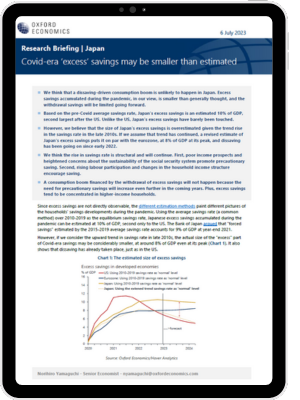Japan: Covid-era ‘excess’ savings may be smaller than estimated

We think that a dissaving-driven consumption boom is unlikely to happen in Japan. Excess savings accumulated during the pandemic, in our view, is smaller than generally thought, and the withdrawal savings will be limited going forward.
Based on the pre-Covid average savings rate, Japan’s excess savings is an estimated 10% of GDP, second largest after the US. Unlike the US, Japan’s excess savings have barely been touched.
What you will learn:
- However, we believe that the size of Japan’s excess savings is overestimated given the trend rise in the savings rate in the late 2010s.
- We think the rise in savings rate is structural and will continue. First, poor income prospects and heightened concerns about the sustainability of the social security system promote precautionary saving. Second, rising labour participation and changes in the household income structure encourage saving.
- A consumption boom financed by the withdrawal of excess savings will not happen because the need for precautionary savings will increase even further in the coming years. Plus, excess savings tend to be concentrated in higher-income households.
Tags:
Related posts

Post
How Asia’s supply chains are changing | Techonomics Talks
Global supply chains have continued to expand, despite talk of deglobalization and nearshoring. US and Japan have started to de-couple from China, but other G7 countries grow more dependent on Chinese inputs. Several "hotspots" are emerging across Asia with multiple winning formulas.
Find Out More
Post
BoJ to raise its policy rate cautiously to 1% by 2028
We now project that the Bank of Japan will start to raise its policy rate next spring assuming another robust wage settlement at the Spring Negotiation. If inflation remains on a path towards 2%, the BoJ will likely raise rates cautiously to a terminal rate of around 1% in 2028.
Find Out More
Post
Japan inflation to rise to 1.8%, but downside risks are high
Reflecting a surprisingly strong Spring Negotiation result and weaker yen assumption, we have upgraded our baseline wage and inflation forecasts. We now project higher wage settlements will push inflation towards 1.8% by 2027. Uncertainty is high, however.
Find Out More